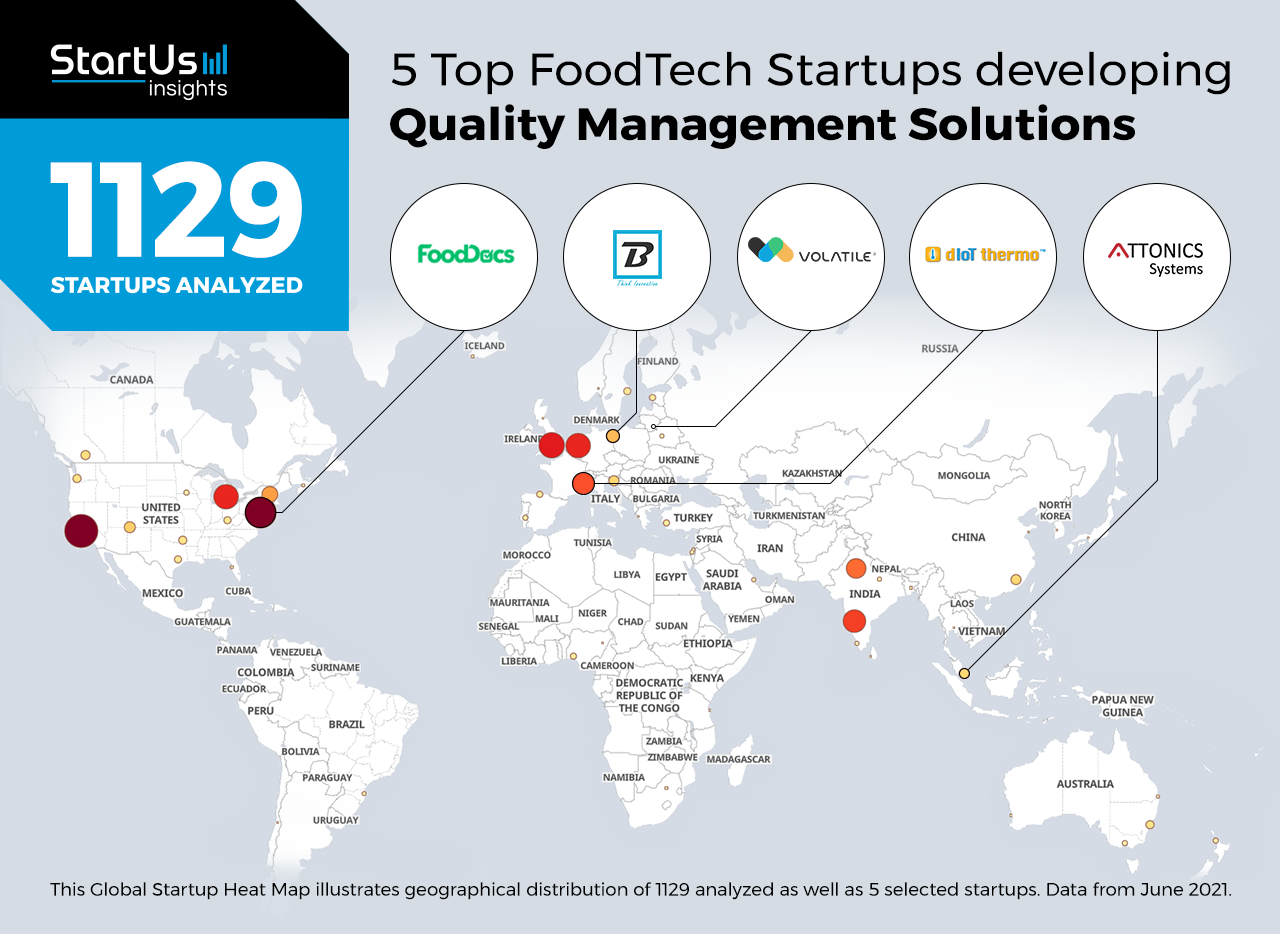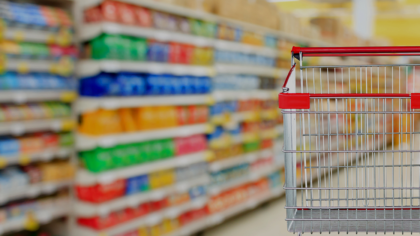Staying ahead of the technology curve means strengthening your competitive advantage. That is why we give you data-driven innovation insights into the food industry. This time, you get to discover 5 hand-picked startups developing quality management solutions.
Global Startup Heat Map highlights 5 Top Food Quality Management Solutions out of 1.129
The insights of this data-driven analysis are derived from the Big Data & Artificial Intelligence-powered StartUs Insights Discovery Platform, covering 2.093.000+ startups & scaleups globally. The platform gives you an exhaustive overview of emerging technologies & relevant startups within a specific field in just a few clicks.
The Global Startup Heat Map below reveals the distribution of the 1.129 exemplary startups & scaleups we analyzed for this research. Further, it highlights 5 food startups that we hand-picked based on criteria such as founding year, location, funding raised, and more. You get to explore the solutions of these 5 startups & scaleups in this report. For insights on the other 1.124 quality management solutions, get in touch.
dIoT Thermo develops a Food Safety Monitor
Improper food storage often leads to food quality degradation. Due to strict health standards, food that does not meet storage criteria, even for a short duration, must be disposed of by restaurants or supermarkets, for example. This is not only a waste of food but a loss of revenue as well. To avoid this, startups are developing Internet of Things (IoT)-based sensor solutions to monitor food storage temperature.
Italian startup dIoT Thermo develops a cloud-based IoT food safety monitoring system. The startup’s solution uses LoRa (Long Range) devices and wireless radio frequency technology to collect data from wireless sensors. It then analyzes the data to gain proactive insights to eliminate inventory loss, streamline operations, and reduce equipment failures. Additionally, it enables foodservice companies to maintain food quality and Hazard Analysis and Critical Control Point (HACCP) compliance with remote temperature monitoring.
FoodDocs provides AI-based HACCP Plans
A HACCP certification ensures that the food being offered by a business or company is of high quality and follows health and safety protocols. HACCP is important as it controls potential hazards in food production and the documentation process often contains many legal and administrative requirements. To remove the requirement of seeking external health consultants when filling in HACCP paperwork, startups are creating AI-based software solutions.
US-based FoodDocs creates an AI-based solution that builds internationally qualified and compliant HACCP plans. The AI-based HACCP plan builder requires less than an hour and uses questionnaires to simplify the process. Additionally, it maintains food quality through traceability by documenting all produced batches and the shelf life of components used. The production module within their solution manages all product-related information, which includes shelf-life of products, instructions to prepare food, information relating to allergens, and more.
Volatile develops Olfactory Sensing Solutions
In many food production systems, the quality of the food product is best determined by its aroma. Today, many food processing units use aroma as a quality check factor as most sensing equipments are not sensitive enough to detect smells. This is why startups are developing advanced olfactory sensors that use intelligent algorithms for aroma-based food quality management.
Lithuanian startup Volatile specializes in olfactory monitoring for specific flavors, odors, and gases. The startup’s olfactory sensing solution relies on bioinspired artificial intelligence algorithms, mimicking the way insect brains respond to smell. Their technology includes a proprietary chip containing long lifespan MOX gas sensors, that can withstand temperature fluctuations. Currently, the solution already supports breweries by tracking the aroma throughout the brewing process.
Attonics uses Fluorescence Spectroscopy to Analyze Food Samples
The global dairy industry is increasing in volume due to factors such as rising populations, innovations in dairy production, and more. However, dairy products are prone to be adulterated with substances such as vegetable fats, sugars, and foreign proteins. To ensure that dairy products have the highest standards of quality, startups develop spectroscopic detection technologies to monitor the composition of products.
Singaporean startup Attonics manufactures a handheld and low-cost spectrometer. The startup’s device, Atto³, uses a patented interferometer chip that offers research-level performance and uses either white LEDs and UV LEDs for fluorescence, depending on the application. The device quickly scans and compares the composition of samples without needing large or expensive equipment or processes.
Bosetein creates Real-Time Bacterial Inspection Technology
Meat products are transported all around the globe as certain types of meat, such as Wagyu beef from Japan, are popular among consumers in many countries. Currently, quality control or quality checks of meat products are done before packaging. However, this method proves to be ineffective as bacteria can grow even on preserved meat. To address this challenge, startups are developing bacterial detection solutions that work through layers of packaging.
German startup Bosetein develops real-time bacterial inspection technology for food inspection. The startup’s sensor solution utilizes optical technology and AI algorithms to estimate the freshness level of meat items through the packaging in real-time. The optical sensors collect bacterial growth data within packaged meat, which is processed by AI in real-time to estimate the number of bacteria present thus serving as an indicator of meat quality. The solution integrates with existing production and supply chain infrastructure and finds applications as either stand-alone systems or hand-held devices for real-time spoilage detection.
Discover more Food Tech Startups
Food tech startups such as the examples highlighted in this report focus on robotics, 3D food printing, alternative proteins as well as personalized nutrition. While all of these technologies play a major role in advancing the food industry, they only represent the tip of the iceberg. To explore more food technologies, simply get in touch to let us look into your areas of interest. For a more general overview, you can download our free Food Innovation Report to save your time and improve strategic decision-making.




![Food and Beverage Industry: Top 10 Technology Trends [2025 & Beyond]](https://www.startus-insights.com/wp-content/uploads/2024/11/Food-and-Beverage-Industry-Trends-SharedImg-StartUs-Insights-noresize-420x236.webp)




